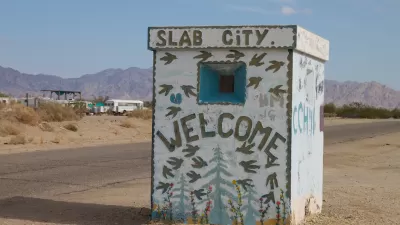In this piece, Stewart Brand argues that squatter cities will grow greatly over the next few decades, and the world will be better because of it.
"New shanty-towns lack sanitation, water, electricity, and organization. In the early years, the place stinks, water and power are stolen and irregular, organization is improvised and sometimes criminal, and the homes are hovels. The whole community is always under threat of being bulldozed out of existence. But the outlaw citizens find themselves in a cash economy at last, and it is vibrant. Every lane among the shacks teems with food stalls, cafés, hair salons, clothing racks, temples, health clubs, and mini-shops selling everything. Cell phones abound. Most of the economy is "informal"-no deeds, no licenses, no taxes. Everyone works, including the children, many of whom are also getting some education, often from private informal schools. Rupee by rupee, shilling by shilling, peso by peso, real by real, squatter families are working their way up in the world.
As they do so, they lift the world with them."
Brand calls squatters the dominant city builders in the world.
FULL STORY: Urban squatters save the world

Planetizen Federal Action Tracker
A weekly monitor of how Trump’s orders and actions are impacting planners and planning in America.

Chicago’s Ghost Rails
Just beneath the surface of the modern city lie the remnants of its expansive early 20th-century streetcar system.

San Antonio and Austin are Fusing Into one Massive Megaregion
The region spanning the two central Texas cities is growing fast, posing challenges for local infrastructure and water supplies.

Since Zion's Shuttles Went Electric “The Smog is Gone”
Visitors to Zion National Park can enjoy the canyon via the nation’s first fully electric park shuttle system.

Trump Distributing DOT Safety Funds at 1/10 Rate of Biden
Funds for Safe Streets and other transportation safety and equity programs are being held up by administrative reviews and conflicts with the Trump administration’s priorities.

German Cities Subsidize Taxis for Women Amid Wave of Violence
Free or low-cost taxi rides can help women navigate cities more safely, but critics say the programs don't address the root causes of violence against women.
Urban Design for Planners 1: Software Tools
This six-course series explores essential urban design concepts using open source software and equips planners with the tools they need to participate fully in the urban design process.
Planning for Universal Design
Learn the tools for implementing Universal Design in planning regulations.
planning NEXT
Appalachian Highlands Housing Partners
Mpact (founded as Rail~Volution)
City of Camden Redevelopment Agency
City of Astoria
City of Portland
City of Laramie



























